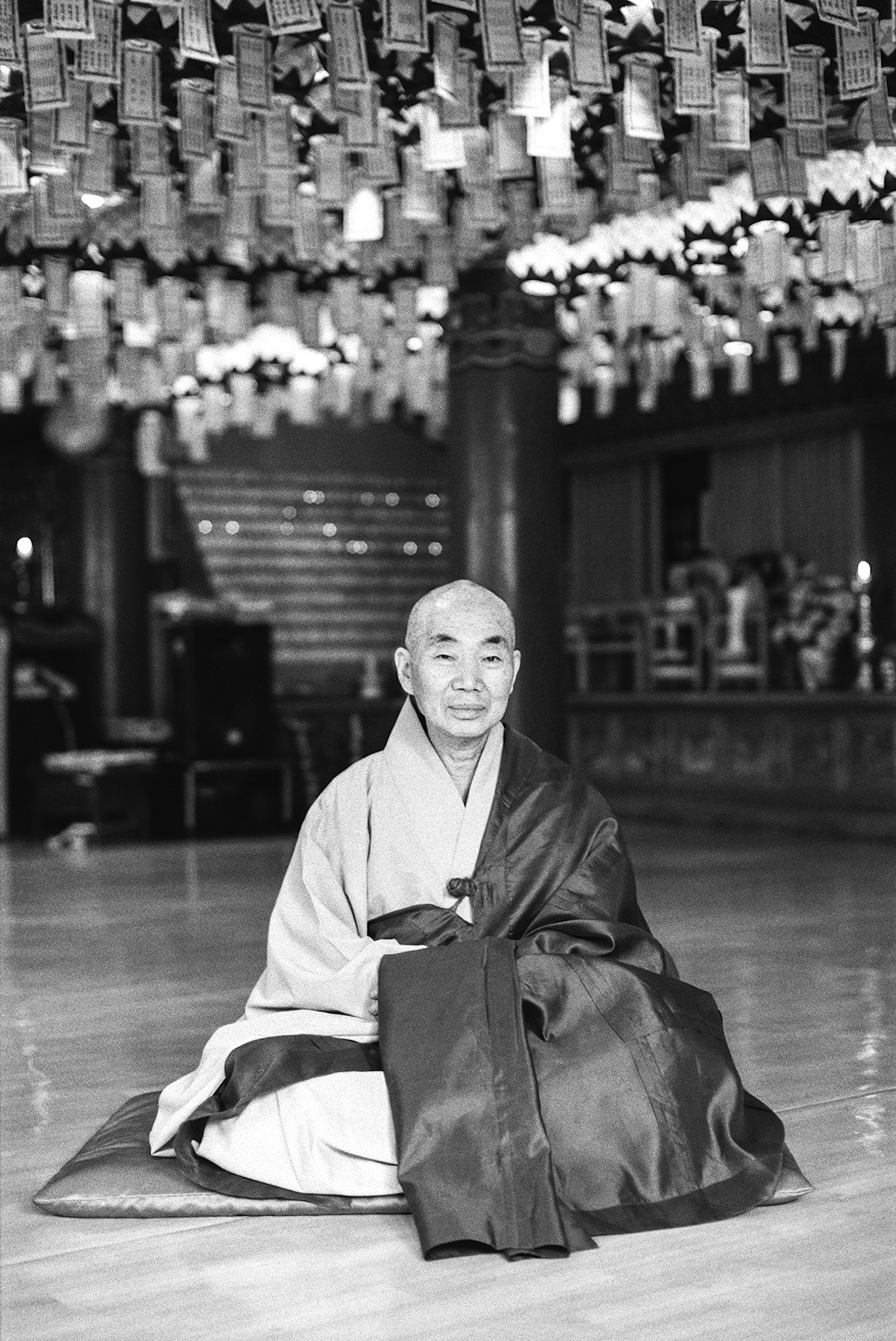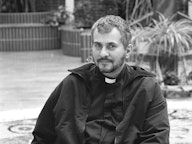
Han Young Ho
Seoul, South Korea
Buddha-Mind and Buddha-Nature
I grew up in a small town, an underdeveloped town. When I was a child, I had many difficulties. I faced the Korean War. Yes, the Korean War had erupted; I was in the sixth grade at that time. There were bombings in my town; a lot of people were killed. So after going through those things, after going through such painful experiences about the war, I began to think about what would come of this world. So...after graduating school, to live in this world, I thought that I needed to change significantly. In 1951, I turned to Buddhism.
A brother of my grandmother believed in Maitreya, and he told me a scary world will pass and a good world will come. He recommended believing in Buddhism and led me. Even though I was a young student, I decided to turn to Buddhism. I don't think I knew much about religion at that time. But as time passed, I began to wear a robe, and I shaved my head, and through much meditation and studying, I was more into Buddhism.
So after the war, I went into training. I studied the sutras and began hard training through Zen meditation to find myself.
When I was studying, I needed food, so I picked up mugwort and ate it. I went into cold water, and meditated while rubbing the cold water on my body. I also picked acorns and ate them. Some of my fellow students lost a lot of hair and felt very painful. It was a part of our training.
We followed the life of a mendicant to get food. After monks finished 100 days of meditation at the temple, we went to all parts of the country to receive alms so that we could have food to eat. It was a training that Buddha had done. So through that training, we were able to collect food as well as to learn how people were living and how they were leading their daily lives.
In that training, sometimes I was bitten by dogs. I almost drowned in a river when I tried to cross it under heavy rainfall. It was painful. I also found random places to sleep on the street when the sun went down.
After getting offerings from people, we went back to the temple, and went into a 100-day training. During the training, we would eat just one meal a day, and we would eat only raw vegetables.
There were some difficult moments while I went to get offerings. Some Christians kicked me out just because I had a different religion. I felt suffering from those experiences. I felt a huge difference between theory and reality.
Although I felt disappointed by those people, I chanted for them and wished for their success and well-being.
Everyone has a mind, and the mind itself is Buddha. People have a tendency to have greed and desires and be obsessed with objects. But you should refrain from greed and desires as well as try to avoid them with a Buddhist mind. If you keep making efforts and progress in this way, you can have a Buddhist mind.
As I am a disciple of Buddha, my greatest wish is to become a Buddha until death with my Buddhist mind. That’s why I’m continuing with my training, meditation and exercise. My intention is continuing to tell Buddha’s law so that we can all be Buddha.
Daniel’s Reflection
I met Han Young Ho in Seoul, South Korea at the Buddhist temple where he presided as the senior monk. I first interviewed the junior monk, who was a martial arts expert, while Han Young Ho quietly and respectfully waited. He was gracious in welcoming me to the temple. After his interview, he played the buk, the traditional Korean drum, while chanting. Then I was treated to an amazing lunch in the temple.
Han Young Ho’s mere presence impressed me. His energy was grounded yet humble even as the senior official of this temple. What he revealed about growing up in difficult circumstances during the Korean War took me to a place of compassion. I was taken by his statements that he “...began to think about what would come of this world,” and that a big change was needed in this world.
I wished that I would’ve been mature enough to have had a similar realization at age 18. It was fortunate that an elder in Han Young Ho’s family shared the insight that a “scary world will pass and a good world will come,” and recommended he follow the Buddhist path. Imagine if everyone exposed to war made a choice to follow Buddhism. I believe this world would be a very different and more peaceful place.
The training that Han Young Ho received to become a Buddhist monk was harsh. That life requires begging for alms, relying on the kindness of strangers for where to sleep when traveling, and being in constant service to others. I was deeply moved when he described an incident about going to a church for alms and being kicked out because he was of a different faith. He said, “It was how I learned about suffering. It was one of the most difficult things.” Although he was disappointed, he chanted for them and wished for them success and well-being.
Buddhism is misunderstood to be a religion. It is a philosophy and way of life. The teachings of Buddhism came from Siddhartha Gautama after he attained enlightenment over 2,600 years ago in India. The core beliefs of Buddhism, known as the Four Noble Truths,1 are:
Life is suffering.
The cause of suffering is craving.
The end of suffering comes with an end to craving.
There is a path which leads one away from craving and suffering.
Many people misunderstand the core belief of Buddhism—life is suffering—as a negative and fatalistic view of the world. Really it is meant to reflect the mere reality that a lot of human suffering is self-created by our thinking and poor decision making.
I certainly have experienced suffering in my own life, as has every other human. A 12 Step sponsor once said to me, “Daniel, your life is not your problem. Your thinking is your problem!”
Buddhists do not believe that the Buddha was or is God, but they seek to emulate God. That is what is referred to as the Buddha-mind or Buddha-nature. I love that Han Young Ho, even as someone more towards the end of his life than at the beginning, said that he wished to die with the mind of a Buddha. That statement reminded me of a Catholic priest in his 90s whom I met in Caracas, Venezuela who told me his greatest wish was “to follow the requests of his superiors.” The discipline and commitment to a life of spiritual development (wherever I find someone who is living it) is impressive and truly awe-inspiring.
There are multiple understandings of Buddha-mind and Buddha-nature. One is that each human being has the potential to become a Buddha. The other understanding is that everyone is already a Buddha and they realize it not because of how they cover up their true nature. According to Guo Gu, the Mahaparinirvana sutra says: “All sentient beings are replete with Buddha-nature. It is only due to their vexations that they do not know or perceive it.”2 Still another interpretation is that Buddha-nature is the nature of the world that is full of both suffering and the potential for enlightenment that humans likely cannot fully achieve but which they must strive for each day.
What can I do to follow the example of Han Young Ho, to realize my own Buddha-nature? How can I get out of the way of my own crazy thinking? Well, in the month of September 2022 I started meditating 30 minutes a day. This was after many decades of trying to practice it and yet avoiding meditation. I use Reb Zalman Schachter-Shalomi’s word that combines ‘God’ and ‘breath,’ or “Yah,” as my mantra. It is cleansing as well as grounding. I am a believer in good psychiatric help, and for a decade I have taken an excellent antidepressant drug that stopped much of my spinning, circular thinking. My spiritual work continues to help me identify false ideas and harmful actions in my life that I can prevent or correct. And, most of all, I feel that if I am useful to God and to my fellow human beings at every opportunity, I can release my crazy thinking to reveal more of my Buddha-nature.
I am grateful for the example that was shown to me one simple afternoon in Seoul by the Buddhist monk Han Young Ho. His groundedness and humility, his eagerness to welcome me, chant, drum for me, and feed me taught me a valuable lesson about Buddha-mind and Buddha-nature.
References
-
The Four Noble Truths. Permission to quote from World History Encyclopedia granted from Joshua J. Mark, July 22, 2021.
-
Gu, Guo. January 26, 2022. Lion’s Roar, “This Very Mind is Buddha.”
Explore the portraits by theme
- happiness
- grief
- addiction
- sexuality
- sobriety
- transgender
- alcoholism
- suicide
- homelessness
- death
- aggression
- cancer
- health
- discipline
- abortion
- homosexuality
- recovery
- connection
- enlightenment
- indigenous
- depression
- meditation
- therapy
- anger
- forgiveness
- Doubt
- interfaith
- worship
- salvation
- healing
- luminaries

